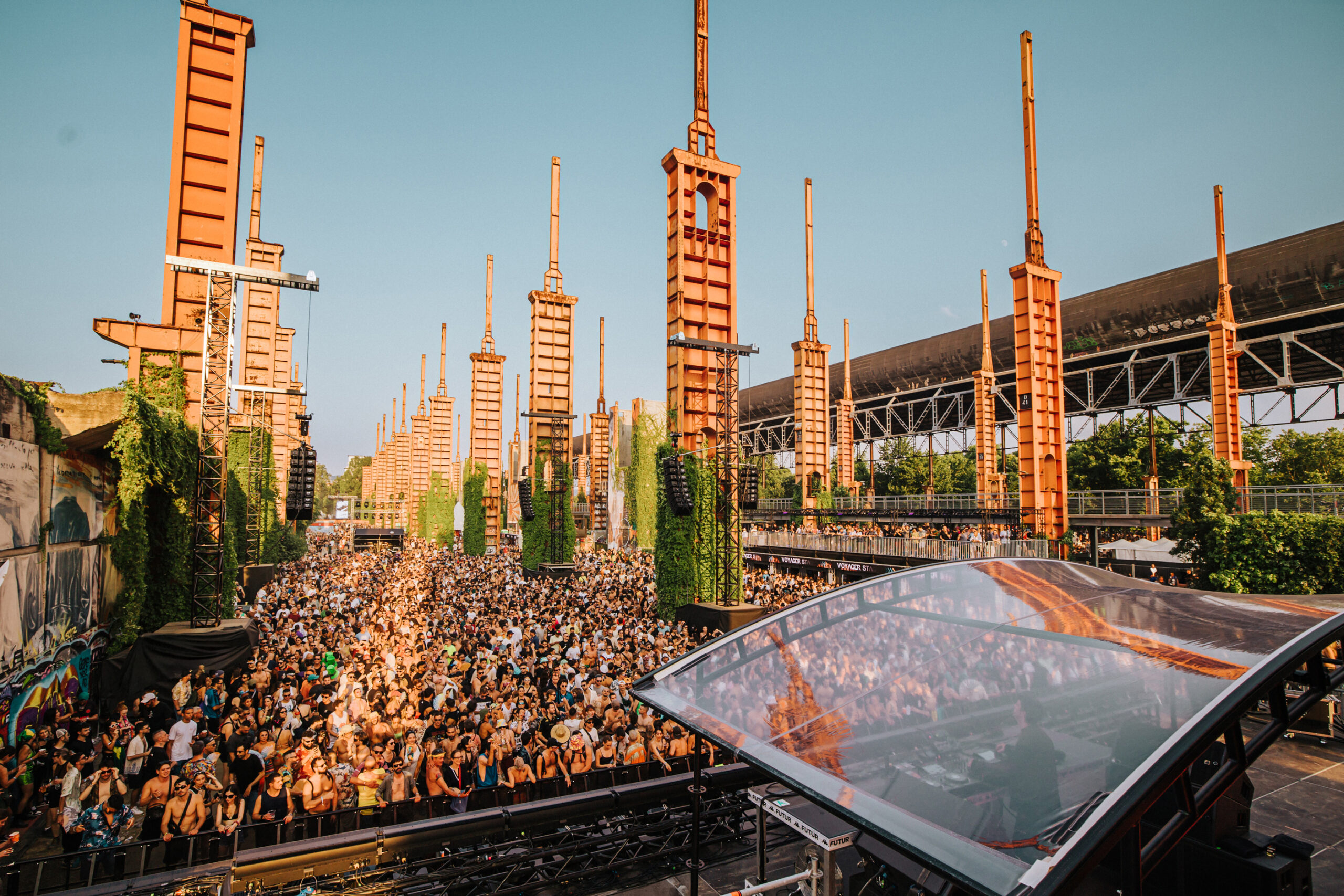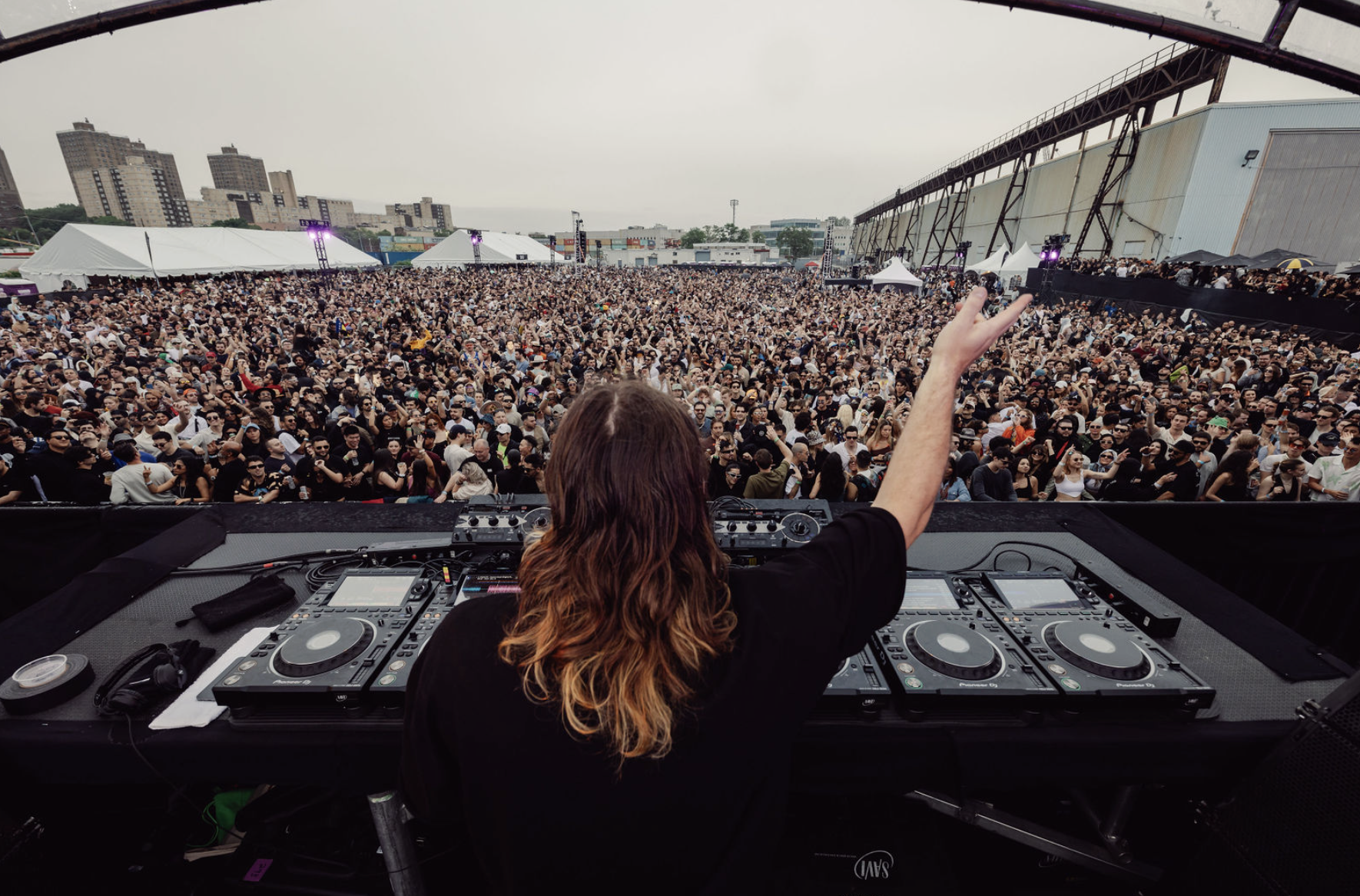Cutting his teeth producing music in the New York electronic scene, the Baltimore based studio wizard, nonRA releases a bandcamp exclusive techno and ambient 11-track album, Dead Pendulum. A standout track from the album is the second track ‘In Sectors’, packed with high energy and experimental-EDM. As we explore the sonic journey nonRA navigates we dive into more of an insightful conversation around music production, modular synthesizers and experimentation as well as touch on his resemblance of Tipper, the east coast rave scene and life.
nonRA shares on ‘In Sectors’ and the meaning behind “Dead Pendulum”,
“‘In Sectors’ is definitely the most techno-esque track on the album with the four-to-the-floor beat. The baseline helps keep the beat slightly unbalanced and also compliments the almost monotone vocal elements. The percussion sounds took on a metallic machine-like quality or maybe a better description would be of sheared metal or metal parts in motion.
The vocalizations are cold, steely and somewhat sterile to match the mood of the percussion sounds. The core focus of the track is the warm mid/deep-range arpeggiated engine type sound. That sort of whistling vocal sound came about at the end from manipulating a percussion track. The overall mood evokes a type of rhythmic machine or factory process, one that is of a dark nature.
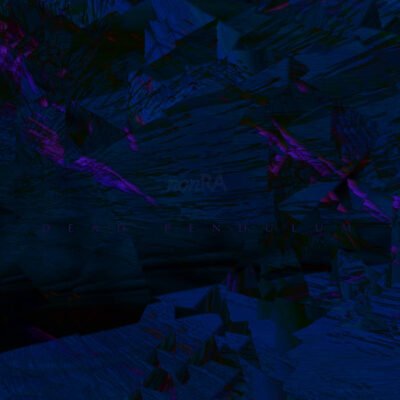
Dead Pendulum is a reference to a feeling about the current state of humanity, as though we’re stuck going in one direction and hoping that there will be a return swing in the opposite direction. I guess we’ll see.”
Throughout the album, ‘Lights Over Antartica’, finds a rolling beat with gas keeping the beat sharp and bouncing around your mind as it grows from an otherworldly, starry-night ambient intro. ‘Born Unto Lie’ continues to explore another world’s sonic landscape and hits with an offbeat snare while consuming you with a monstrous synths.
‘To Forgive and To Be Forgiven’ are ‘Delusion Faction’ are great ambient tracks that would make for mystifying layers from the 3rd or 4th deck during a DJ set.
‘Conscience Test’ offers bright frequencies that seemly open the clouds as if passing a moral test following the track’s turmoil of a beginning. ‘Elemental Variable’ stands strong as a club-ready techno track finished with nonRA’s ambient touch. ‘Vintage Love’ boosts a gripping sound with an exploratory beat riddled with sharp scratches. Closing out the album is ‘We Are Game’ continues to introduce new sound waves and leaves the journey open ended.
Interview with nonRA
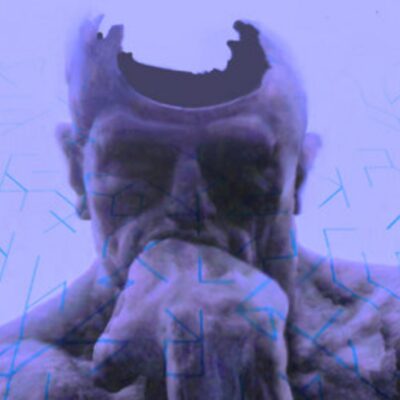
What experimental samples you have played with for your productions?
Probably the weirdest sample I used in a track was on the track titled ‘Morbid Affection’ from the album Ex Terrestrial. It’s the voice of a woman discovering that her arm has been magnetized through medical mishap. I’ll just leave it at that.
What are 5 tracks you find at the forefront of electronic music?
I’m not sure that these are at the forefront anymore but these are the tracks that inspired me the most when I first started listening to electronic music.
- ‘Tundra’ by Squarepusher, from the album “Feed Me Weird Things”
- ‘Tha’ by Aphex Twin from the album “Selected Ambient Works 85-92”
- ‘Kapol Intro’ by Autechre from the album “Incunabula”
- ‘Reach For The Dead’ by Boards Of Canada from the album “Tomorrow’s Harvest”
- ‘Long Distance Tiara’ by Proem from the album “Negativ”
What is one life philosophy you like to live by?
If I had to pick an overwhelming philosophy above others I guess it would be to not be afraid of trying to fulfill a dream. For all we know we only get one chance at life, so you better give it a shot because there might not be another time around. Also, not to be afraid of failure. Failure and how to deal with it teaches you far more than an easy success. You can use failure to push you further.
Could provide a brief explanation of analog music production?
The best way to understand analog compared to digital is to think of a ramp compared to stairs. A ramp (analog) has a smooth incline or decline where as stairs (digital) are segmented discrete levels.
So there is a lushness to analog sound when compared with digital sound and now they (people much smarter than me) are able to emulate this style of sound digitally.
Digitally emulated analog sound will never truly be analog but it gets close.
How do you use a modular?
I’m probably not the best person to ask about modular synthesis because I only use them virtually with the software that I use. Reason allows you to use the different instruments, effect processors, oscillators and gates as modules that can be interconnected. You do this using CV (control voltage) connections, different than standard audio input/output connections.
So a modular synthesizer would be one whose various components (oscillators, filters and gates) could be wired or rewired manually and where you could use one component to control multiple other components and vice versa.
For instance the most common would be using an LFO (low frequency oscillator) to control the pitch or frequency of a sound. Here is picture to show you an example of the type of CV wiring you can do in Reason. In this example I have a sound signal passing through two effect processors (orange and black devices). The piece of equipment on the bottom doesn’t have a sound signal passing through it but it’s being used to control aspects of the two other effects processors after it’s first passed through a spliter. The splitter allows you to modulate multiple effects with one waveform. Once you get the hang of it you can get very creative with the way you connect things.
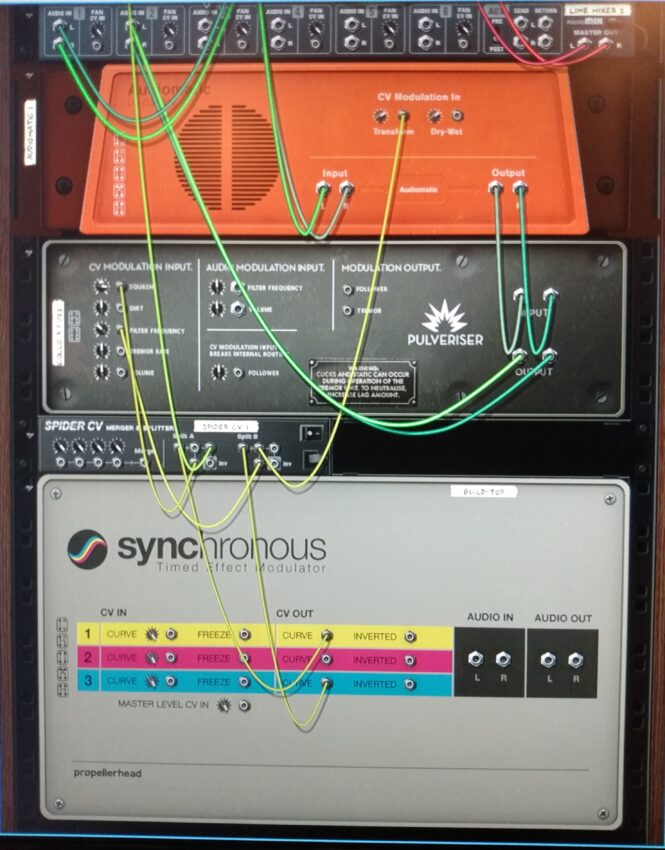
What are some of your favorite events, venues and artists from Brooklyn and Baltimore?
Ottobar is probably the best place to see a show in Baltimore. I saw Com Truise there not too long ago and I really enjoyed that show. Also, Ram’s Head Live is a great place to see music in Baltimore. It’s been so long since I lived in New York I’m not sure any of the places I used to go to are still there. There was a bar and CD store in Brooklyn on Smith Ave. called Halcyon that played really cool electronic music, that’s where I started getting into it. This was well over a decade ago, it’s probably long gone.
What are some of the best electronic music production tools and equipment out there? Anything you are looking to invest into soon?
I predominately use Ableton Live and Reason software to create the music. Live is a great program to use. The session view really let’s you map-out different individual track combinations before you start working on the more detailed arrangements. Reason is great for musicians who like to work with sound engineering because it mimics real hardware. If you’ve never seen it before you can connect different pieces of virtual equipment as you would in the real world.
For instance, you can use an effect processor to change a particular aspect of a keyboard sound or drum machine sound by (virtually physically) wiring the processor to that attribute. Most virtual synths have this ability too but Reason allows you to do this over multiple pieces of emulated equipment in such a creative way. I’ve been using several u-he VST synths lately. Zebra and Tyrell in particular. Zebra is a sound engineer’s dream and I’m just beginning to understand how to use it. Tyrell is a classic analog-esque VST and very easy to use. It has a great sci-fi 80s sound to it.
Are you a fan of Tipper?
Yes, I’ve definitely listened to Tipper and enjoy his music very much. The complexities of his sounds are remarkable. Truly some of the most unique sounds being created in electronic music. I guess I’ll mention some other artists I enjoy here because I didn’t exactly answer your question about tracks at the forefront of electronic.
Some other electronic artists that are (or have been) inspiring me are Milieu, Skee Mask, Plaid, Oneohtrix Point Never, Ital Tek, Andy Stott, Chrome Sparks, Om Unit, Floating Points, Clark, mu-ziq, Ochre, Casino Vs. Japan, woob and Mahlow. Mahlow is another one who’s sound I find unbelievable, dark, inspired and intense.
What is cool to you?
I like reading, especially books on electrical theory but that’s probably not cool. I liked painting too, for a long time I did abstract and landscape painting but I’ve put that on the back burner to really focus on music. The characteristics I admire most in other people are humility, courage and kindness. Tenacity, intelligence and a sense of humor are important too.
Favorite dank meal?
Hmm, meatball sub maybe, I’m a man of simple tastes.
What is the significance of your moniker, nonRA?
Well it has a couple meanings. One meaning is jokingly ‘not great’ which is what I thought of my first few album attempts. It has a deeper meaning too, one that I’m not sure I want to reveal but it wouldn’t be hard to figure out with some linguistic sleuthing.
What is one of your goals with your music in the near future?
So much of music is built on the backs of the previous pioneers. I hope I can contribute something new or at the very least make a track that gives somebody goose bumps. I think that’s the true test of exceptional music, it’ll raise your skin. There’s so much great music out there and so many talented people. I spent many years just enjoying other people’s music. I hope that appreciation will serve me well as I continue to establish my own sound from the sounds of all who have inspired me.
